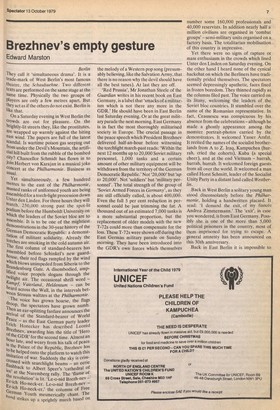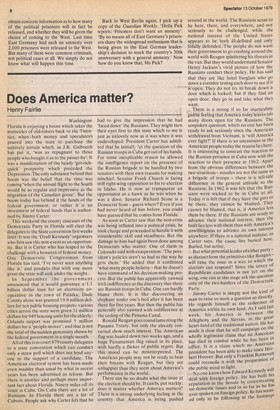Brezhnev's empty gesture
Edward Marston
Berlin They call it 'simultaneous drama'. It is a trade-mark of West Berlin's most famous theatre, the Schaubuehne. Two different texts are performed on the same stage at the same time. Physically the two groups of Players are only a few metres apart. But they act as if the others do not exist. Berlin is like that.
On a Saturday evening in West Berlin the Crowds are out for pleasure. On the brightly-lit streets they, like the prostitutes, are wrapped up warmly against the biting east wind. The papers are full of the latest scandal. Is wartime poison gas seeping out from under the Devil's Mountain, the artificial hill built from the rubble of the bombed City? Chancellor Schmidt has flown in to Join Herbert von Karajan in a musical joke Concert at the Philharmonie. Business as Usual Yet simultaneously, a few hundred metres to the east of the Philharmonie, massed ranks of uniformed youth are being assembled fora torch-light procession down tinter den Linden. For three hours they will March, 250,000 strong past the spot-lit Podium before the Humboldt University on ‘vhich the leaders of the Soviet bloc are to assemble. It is to be one of the mightiest demonstrations in the 30-year history of the German Democratic Republic: a demonstration of militant solidarity. Already the torches are smoking in the cold autumn air. The first column of standard-bearers has assembled before Schinkel's new guardhouse, their red flags rumpled by the wind which blows unimpeded from Siberia to the lajandenburg Gate. A disembodied, amplified voice propels slogans through the twilight air. The occasional shrill word — 1,(arnrif, Vaterland, Heldentum — can be neard across the Wall, in the intervals between Strauss waltzes at the Philharmonic.. d The voice has grown hoarse, the flags -„P, the spectators have grown numb. hen an ear-splitting fanfare announces the arrival of the Standard-bearer of World Peace — as the East German party leader Erich Honecker has described Leonid Brezhnev, awarding him the title of 'Hero Of the GDR' for the second time. Almost an !lour late, and weary from his talk of peace In the Palace of the Republic, Brezhnev has t,c' be helped onto the platform to watch this imitation of war. Suddenly the sky is crisscrossed with searchlight beams — an eerie fl. ashback to Albert Speer's 'cathedral of Ice' at the Nuremberg rally. The 'flame of the revolution is lit 'Le-o-nid Brezh-nev r-ici IT the melody of a Western pop song (presumably believing, like the Salvation Army, that there is no reason why the devil should have all the best tunes). At last they are off.
'Red Prussia', Mr Jonathan Steele of the Guardian writes in his recent book on East Germany, is a label that 'smacks of a militarism which is not there any more in the GDR.' He should have been in East Berlin last Saturday evening. Or at the great military parade the next morning. East Germany is in fact the most thoroughly militarised society in Europe. The crucial passage in the peace speech which President Brezhnev delivered half-an-hour before witnessing the torchlight march-past reads: 'Within the next 12 months up to 20,000 Soviet military personnel, 1,000 tanks and a certain amount of other military equipment will be withdrawn from the territory of the German Democratic Republic.' Not '20,000' but 'up to 20,000'. Not 'soldiers' but 'military personnel'. The total strength of the group of 'Soviet Armed Forces in Germany', as they are still officially called, is about 400,000. Even the full 5 per cent reduction in personnel could be just trimming the fat A thousand out of an estimated 7,000 tanks is a more substantial proportion, but the replacement of older models with the new T-72s could more than compensate for the loss. These T-72s were shown off during the East German military parade on Sunday morning. They have been introduced into the GDR's own forces whichthemselves number some 160,000 professionals and 40,000 reservists. In addition nearly half a million civilians are organised in 'combat groups' semi-military units organised on a factory basis. The totalitarian mobilisation of this country is impressive.
Yet there were no signs of rapture or mass enthusiasm in the crowds which lined Unter den Linden on Saturday evening. On the other hand I heard none of the cynical backchat on which the Berliners have traditionally prided themselves. The spectators seemed depressingly apathetic, faces fixed in frozen boredom. They thinned rapidly as the columns filed past. The voice carried on its litany, welcoming the leaders of the Soviet bloc countries. It stumbled over the name of the Romanian representative. In fact, Ceausescu was conspicuous by his absence from the celebrations— although he made a ghostly appearance among the monster portrait-photos carried by the ' demonstrators. It welcomed Yasser Arafat. It recited the names of the socialist brotherlands from A to Z. Iraq, Kampuchea (hurrah, cried the cohorts), Kuba (a special cheer), and at the end Vietnam — hurrah, hurrah, hurrah. It welcomed foreign guests from all over the world. It welcomed a man called Horst Schmitt, leader of the Socialist Unity Party in a distant land called Westberlin.
Back in West Berlin a solitary young man stood disconsolately before the Philharmonie, holding a handwritten placard. It read: 'I demand the exit, of my fiancee Andrea Zimmermann.' The 'exit', in case YOU wondered, is from East Germany. Possibly she is one of the more than 5,000 political prisoners in the country, most of them imprisoned for trying to escape. A general amnesty has been announced on this 30th anniversary.
Back in East Berlin it is impossible to obtain concrete information as to how many of the political prisoners will in fact be released, and whether they will be given the choice of coming to the West. Last time East Germany had such an .amnesty over 2,000 prisoners were released to the West. But many of them were common criminals, not political cases at all. We simply do not know what will happen this time. Back in West Berlin again, I pick up a copy of the Guardian Weekly. `Hella Pick reports: 'Prisoners don't want an amnesty'. 'By no means all of East Germany's prisoners share the widespread enthusiasm that is being given to the East German leadership's decision to mark the country's 30th anniversary with a general amnesty.' Now how do you know that, Ms Pick?



































 Previous page
Previous page